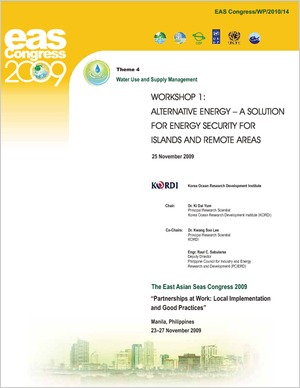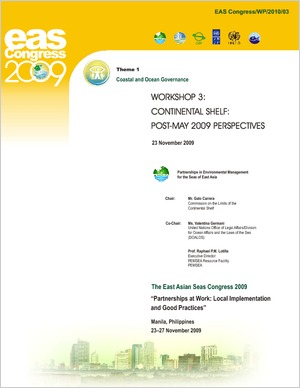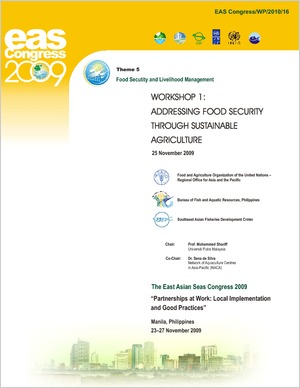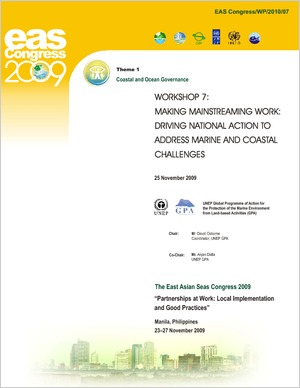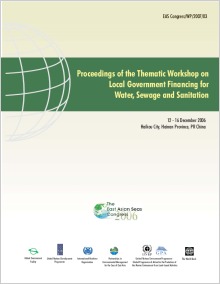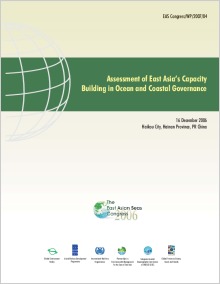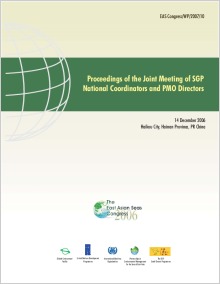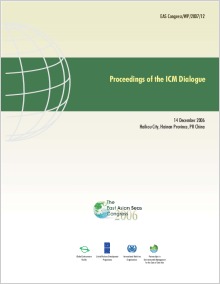
Breadcrumb
Proceedings of the Workshop on Alternative Energy - A Solution for Energy Security for Islands and Remote Areas
This publication summarizes the results of one of the workshops held during the East Asian Seas Congress 2009 on Alternative Energy – A Solution for Energy Security for Islands and Remote Areas. "Energy is essential to economic and social development and improved quality of life. Much of the world’s energy, however, is currently produced and consumed in ways that could not be sustained if technology were to remain constant and if overall quantities were to increase substantially." As clearly stated above in Chapter 9 of the Agenda 21, the promotion of technology development and the use of alternative energy is one of the key essential elements for the sustainable development. Islands are surrounded by the oceans which are abundant in the sources for alternative energy. At the same time, small islands as well as remote areas are facing difficulties in securing the energies, which is inevitable for economic and social development and better quality of life. How to secure energy supply in the islands and remote areas is one of the facing issues to be addressed in order to achieve sustainable development. Is introducing alternative energy in small islands and remote areas feasible? The workshop focused on: The status of the technology development of alternative energy; Feasibility of alternative energies; and Utilization of a new finance scheme for promoting alternative energy development and expansion.
Proceedings of the Workshop on the Continental Shelf: Post-May 2009 Perspectives
This publication summarizes the results of one of the workshops held during the East Asian Seas Congress 2009 on the Continental Shelf: Post-May 2009 Perspectives. This workshop on the national submissions of continental shelf extensions was one of the most important features of the East Asian Seas Congress. In many instances in the past, disputes over land territory pose threats to peace and stability. Quieting of opposing claims and settlement of maritime boundaries will promote regional peace and stability, which is a prerequisite to cooperation in the region to achieve any objective. The United Nations Convention on the Law of the Sea (UNCLOS), which entered into force in 1994, established a new order in the regime of seas. Article 76 of the Convention requires coastal states to establish the outer limits of their continental margin where the margin extends beyond 200 nautical miles from its baselines from which the breadth of the territorial sea is measured. The UN’s Commission on the Limits of the Continental Shelf (Commission) is mandated to investigate the impact of Article 76 and to facilitate its implementation. So far, the Commission has received 51 submissions and 44 preliminary information notes. The workshop looked at the impacts of national submissions from the perspectives of the academe and ocean policy experts. Discussion on issues of maritime boundaries is a necessary academic exercise because undeniably, these may impact peace and stability, and future cooperation in the Seas of East Asia. Mr. Galo Carrera, a member of the Commission, chaired the workshop with Ms. Valentina Germani from the UN DOALOS, as co-chair.
Proceedings of the Workshop on Addressing Food Security through Sustainable Aquaculture
This publication summarizes the results of one of the workshops held during the East Asian Seas Congress 2009 on Addressing Food Security through Sustainable Aquaculture. The Workshop on Addressing Food Security through Sustainable Aquaculture was coconvened by the Bureau of Fisheries and Aquatic Resources – Philippines, Food and Agricultural Organization of the United Nations – Regional Office for Asia and the Pacific (FAO-RAP), and the Southeast Asian Fisheries Development Center – Aquaculture Department (SEAFDEC/AQD). The Pusan National University/Asia-Pacific Phycology Association (APPA) and the University of the Philippines – Marine Science Institute (UP- MSI) also provided technical support to the workshop. The workshop was chaired by Prof. Mohamed Shariff of Universiti Putra Malaysia and was co-chaired by Dr. Jose Ingles of the University of the Philippines in the Visayas. Dr. Rogelio Juliano of the Coastal Management Center, Mr. Mike Phillips of the WorldFish Center, Dr. Jobert Toledo of SEAFDEC, and Mr. Miao Weimin of FAO-RAP acted as panelists during the panel discussion on Ways Forward: Mainstreaming Aquaculture in a Sustainable Development Context. This workshop, which had a total of 12 presentations, aimed to: (1) identify the contribution of aquaculture in food security and alleviation of poverty; (2) outline good practices in sustainable aquaculture production; (3) showcase small-scale aquaculture applications and practices and access to low-cost aquaculture technologies; (4) identify means to address emerging and potential issues and concerns (e.g., social, economic, political, environmental) related to the development of aquaculture; and (5) identify means of integrating aquaculture development into the ICM framework.
Proceedings of the Workshop on Making Mainstreaming Work: Driving National Action to Address Marine and Coastal Challenges
This publication summarizes the results of one of the workshops held during the East Asian Seas Congress 2009 on Making Mainstreaming Work: Driving National Action to Address Marine and Coastal Challenges. During the Second Intergovernmental Review of the Global Programme of Action for the Protection of the Marine Environment from Land-based Activities (GPA), held in Beijing in October 2006 the Governments asked the UNEP/GPA Coordination Office to provide assistance to countries in assessing how the conservation of marine and coastal ecosystems contributes to poverty alleviation and the achievement of the Millennium Development Goals (MDGs). The UNEP/GPA Coordination Office was also requested to support countries in mainstreaming the sustainable development of oceans and coasts into international development frameworks and national planning and budgetary processes. In response to this call, the UNEP/GPA Coordination Office has developed an Analytical Framework, Guidelines and Checklist for the Mainstreaming of Marine and Coastal Issues into National Planning and Budgetary Processes, and organized a series of regional meetings to promote this approach. The workshop aimed to contribute to the understanding of how to reconcile development pressures with protection objectives. The sharing of experiences will seek to provide answers to a number of questions namely; what a policy should contain, what policy choices a nation can afford and how to foster collaboration with various organs of the government and other non-state stakeholders to ensure sustainable management of our coastal and marine ecosystems as a contribution to poverty alleviation and the achievement of the MDGs. During the workshop, speakers from Asia, Africa and Wider Caribbean explored the links between the management of coastal and marine resources, poverty reduction and economic growth, based on their country experiences, with a particular focus on policy development and implementation processes. Countries that have embarked on the development of a coherent policy framework to address these challenges shared their mainstreaming experiences. The Chair, Mr. David Osborn, facilitated open interactions among presenters and the audience to seek clarity and promote dialogues to identify and highlight critical success factors for effective mainstreaming in the context of different political and governance systems, and to develop a plan of action to assist countries in their efforts on mainstreaming coastal and marine issues into national planning and budgetary processes.
Proceedings of the Thematic Workshop on Local Government Financing for Water, Sewage and Sanitation
The Thematic Workshop on Local Government Financing for Water, Sewage and Sanitation was conducted as part of the International Conference on Coastal and Ocean Governance of the East Asian Seas (EAS) Congress 2006, which was held in Haikou City, Hainan Province, PR China, on 12-16 December 2006. The thematic workshop addressed the financing issues of a sector that traditionally is nonprofitable — it is severely under-funded in East Asia, with some countries achieving only one percent coverage in sewerage and sanitation. The presentations focused on the challenges facing the sector, the conditions required to overcome the challenges and successful case studies that can be replicated.
Assessment of East Asia’s Capacity Building in Ocean and Coastal Governance
PEMSEA and UNESCO-IOC conducted a survey in December 2006 to assess East Asia’s capacity building needs in ocean and coastal governance. The survey was undertaken in support of building strategies to strengthen capacity to implement the Sustainable Development Strategy for the Seas of East Asia (SDS-EAS). Part of the initial results of the survey and the discussion on problems as well as future actions were presented and discussed during the EAS Congress in Haikou, Hainan in China in December 2006. PEMSEA and UNESCO, together with the Global Forum for Oceans, Coasts and Small Islands co-organized this Discussion Group consisting of experts from universities, research institutions and governments to initiate discussion on how best the capacity in ocean and coastal affairs could be further developed and strengthened.
Proceedings of the Joint Meeting of SGP National Coordinators and PMO Directors
The first joint meeting of the Project Management Office (PMO) Managers/Staff with their corresponding UNDP GEF Small Grants Programme (SGP) National Coordinators aimed to: 1. Review the objectives, goals and the processes of the SGP-PEMSEA Joint Communiqué; 2. Identify project direction for the next three years; and 3. Explore potential projects for implementation. The meeting was attended by 33 participants from the PMOs of the six participating countries including: Cambodia; Indonesia; Malaysia; Philippines; Thailand; and Vietnam. In addition, four UNDP/GEF/SGP National Coordinators from four countries — Cambodia, Philippines, Thailand and Vietnam were in attendance. The meeting was organized by PEMSEA and chaired by Ms. Angie Cunanan, National Coordinator of the UNDP GEF Small Grants Programme – Philippines.
Report on the Outputs and Outcomes of the East Asian Seas Youth Forum
The East Asian Seas (EAS) Youth Forum was organized as one of the special events of the EAS Congress 2006, convened to provide a venue for dynamic knowledge sharing and youth empowerment, increase the youth’s awareness and appreciation of the rich marine heritage of the EAS region, and enable young people to understand the dynamics of the coastal and marine management through interaction with experts, authorities and fellow young environmentalists. The First EAS Youth Forum was co-organized by the Coastal Management Center and PEMSEA, and participated by forty-five selected young leaders from ten participating countries.
Proceedings of the ICM Dialogue
The ICM Dialogue was organized as part of the Inaugural Meeting of the PEMSEA Network of Local Governments for Sustainable Coastal Development (PNLG) during the East Asian Seas Congress 2006, hosted by the State Oceanic Administration of China, Hainan Provincial Government and Haikou City Government. The Dialogue was held 14 December 2006 at the People’s Assembly Hall in Haikou City, Hainan Province, PR China. The ICM Dialogue was conducted in seven language groups, namely: Bahasa, Chinese, Filipino, Khmer, Korean, Thai and Vietnamese. Each Dialogue was attended by the representatives of local governments in 26 integrated coastal management (ICM) sites. Dr. Jihyun Lee of PEMSEA presented the objectives, mechanics and expected outputs of the ICM Dialogue. Key objectives of the ICM Dialogue were: 1. to provide opportunities for ICM sites to share their experiences, successes, failures and challenges in implementing ICM programs at the local level, without being constrained by language barriers; and 2. to explore future long-term strategies for increasing information exchange and cross-project capacity development among ICM sites having a common language.
